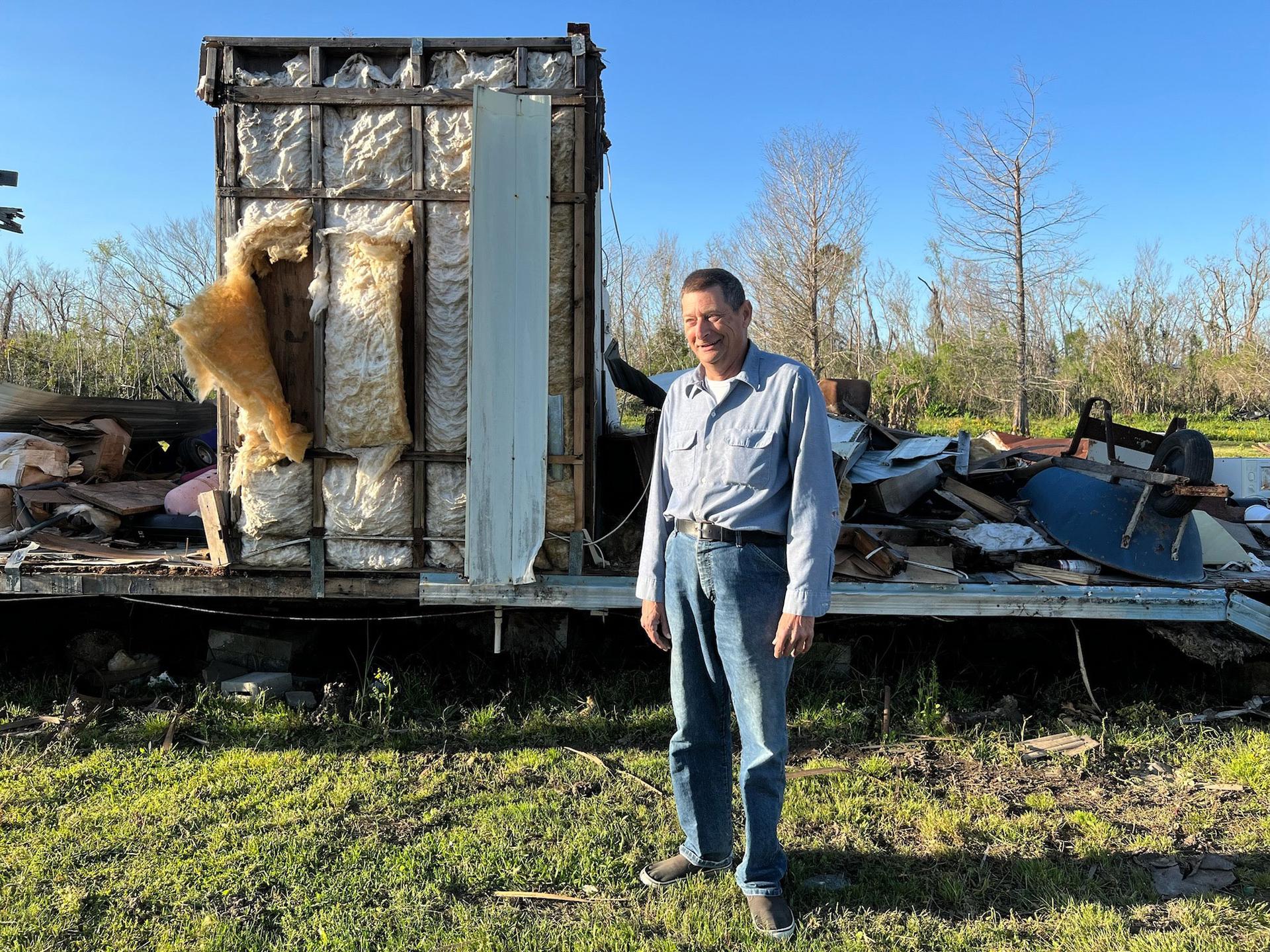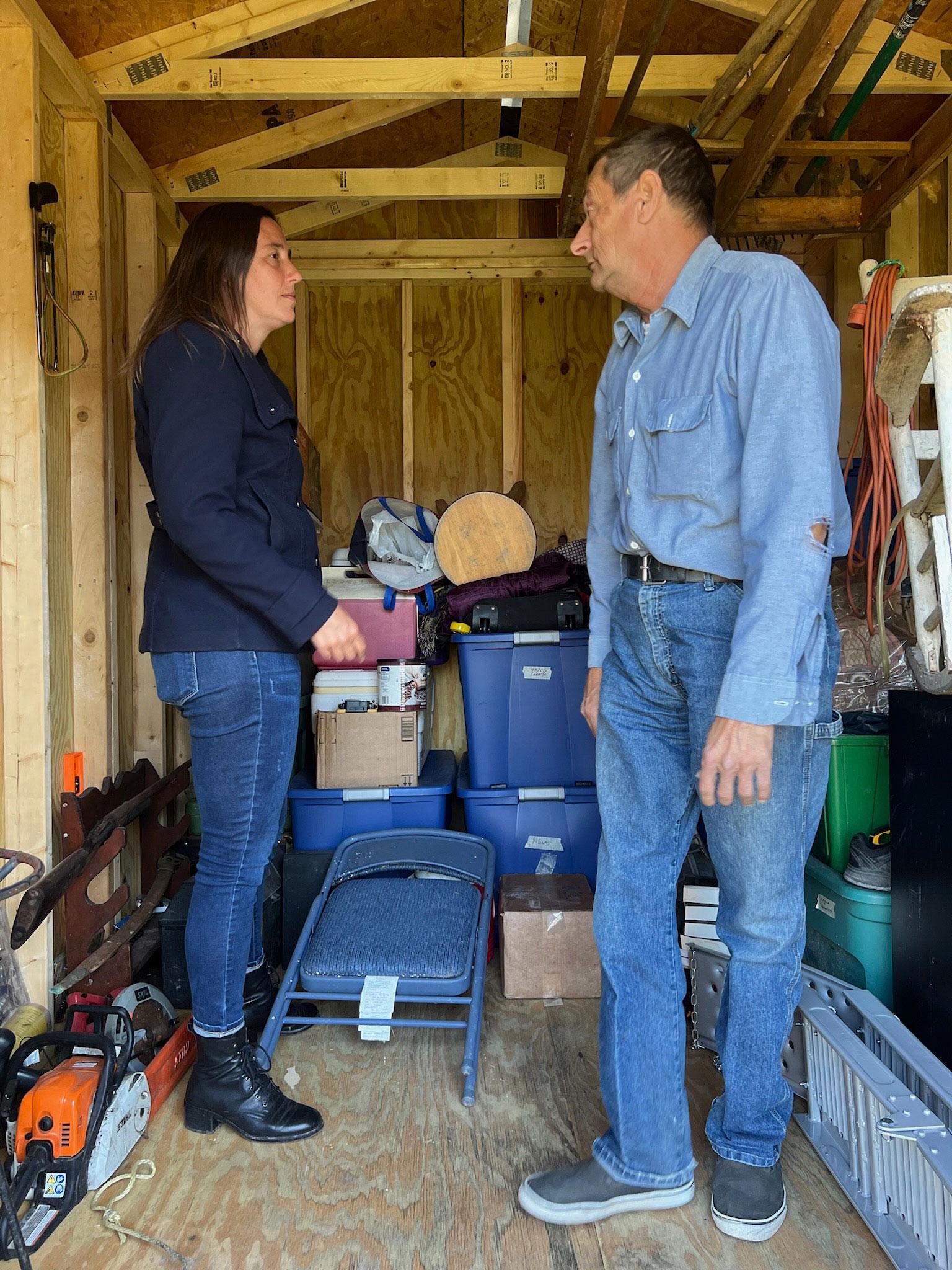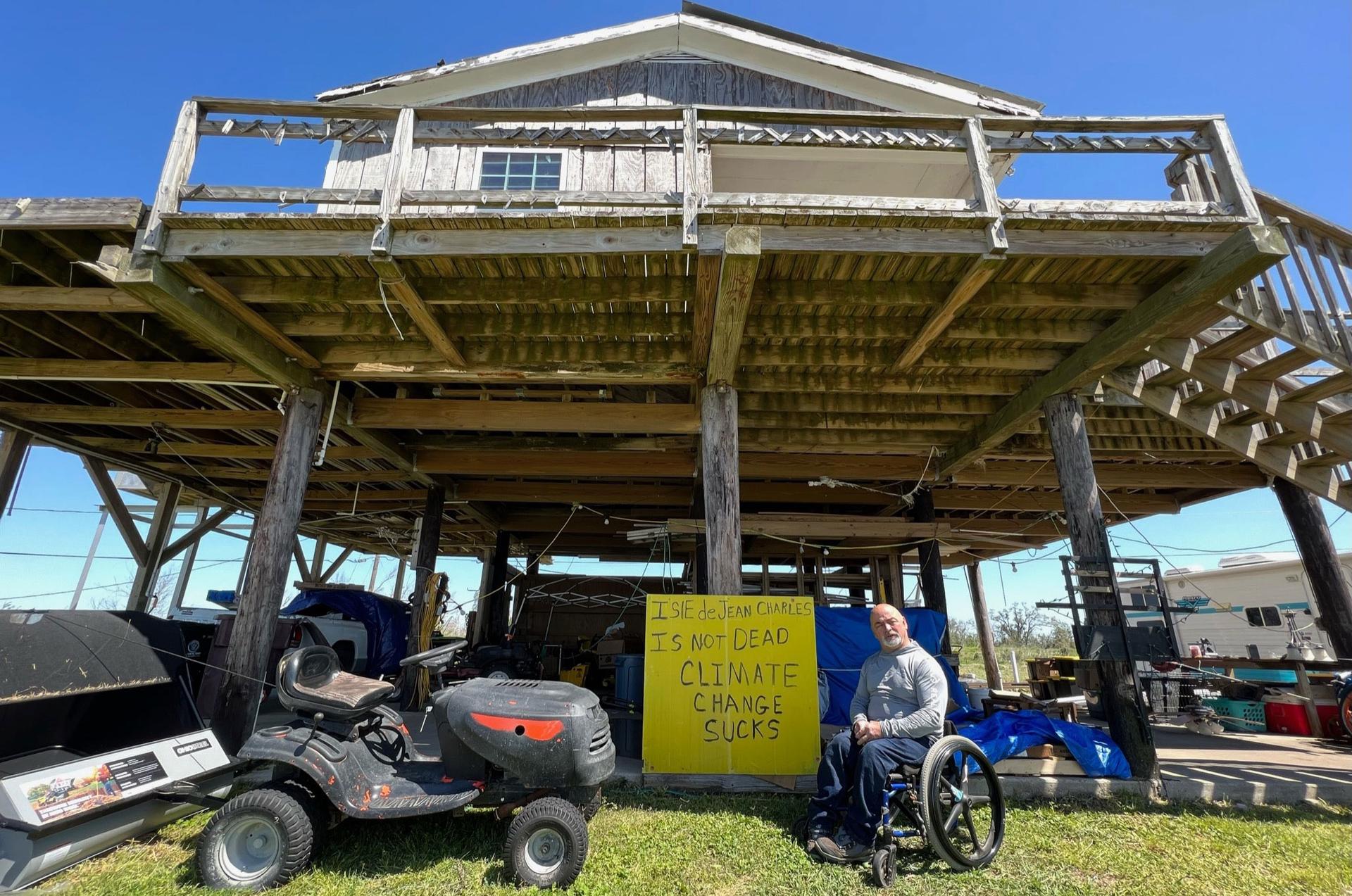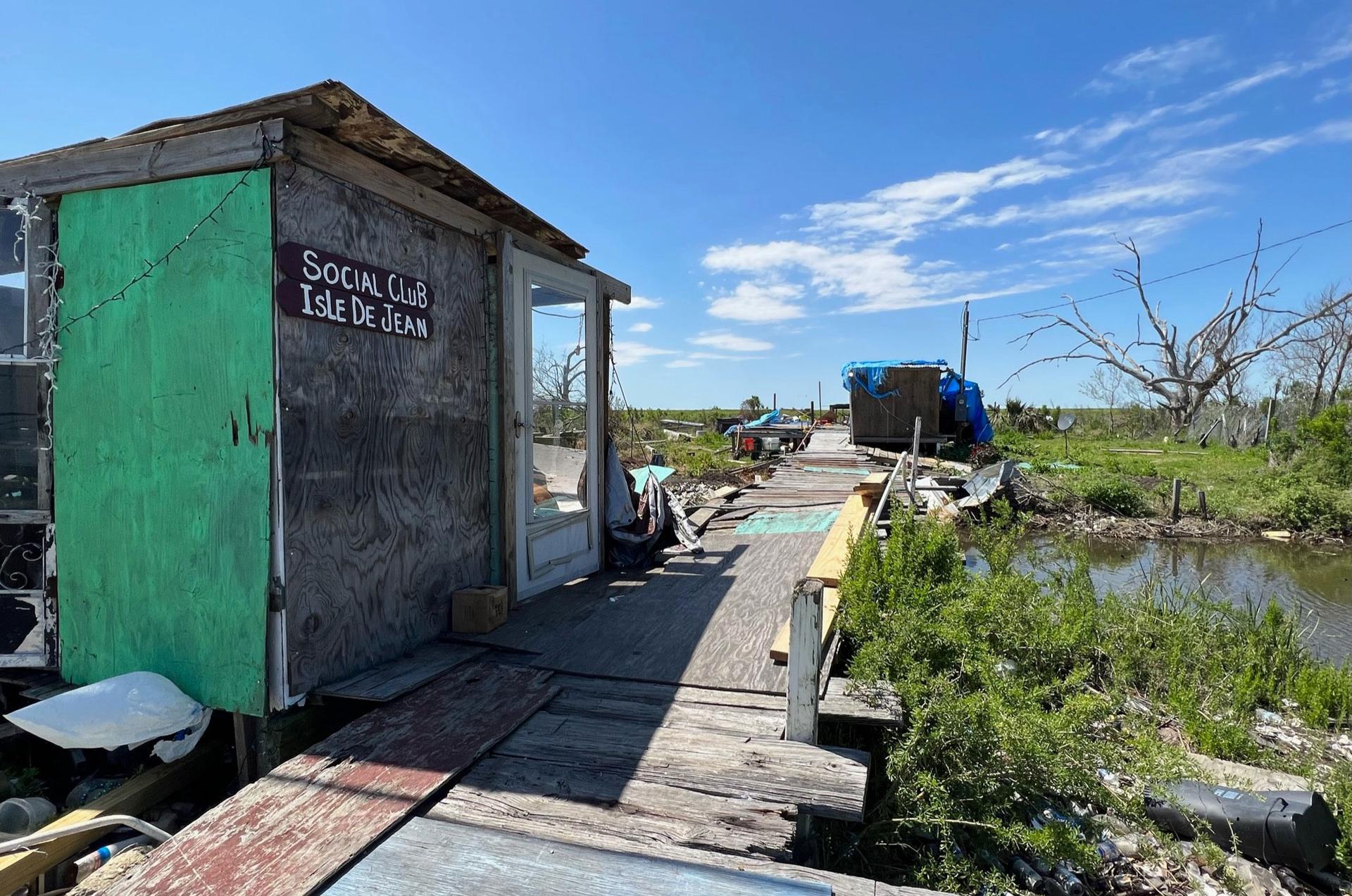Hurricane Ida killed dozens of Lousianans and displaced tens of thousands of others. Among the hardest hit were bilingual and French-speaking communities close to the Mississippi Delta.
Alces Adams lives halfway between New Orleans and the Gulf of Mexico in the small community of Cut Off in Lafourche Parish. Hurricane Ida destroyed his trailer.
People in this part of Louisiana — bayou country — have long learned to live under adverse weather conditions. But things have gotten much worse in recent years. Rising sea levels, erosion and storm after storm have flooded entire communities. For some French speakers, Hurricane Ida was the last straw, and now many are moving away.
A year after Ida, Adams’ trailer looks just as it did the day after the storm — twisted and torn apart with furniture spilling out, as if attacked by a pack of wild animals. Next to it is a new trailer, Adams’ temporary home provided by FEMA, the Federal Emergency Management Agency.

Adams was born a block away in his grandparents’ house. His family’s older generation spoke only French. Adams said his grandmother learned English, but refused to speak it, except for one word: “Yeah.”
“English was forced on us about 100 years ago,” Adams said. That’s when English was declared the only language of instruction in public schools.
Adams recalled listening to his older relatives as they told him stories in French. Even then, he said, he considered the language beautiful. “I loved listening to that.”
Adams’ grandmother and others told him stories of storms and floods they had survived. It helped prepare him — still a child — when Hurricane Betsy battered the region in 1965.
“I was thinking of getting a sash or vest or something: ‘I survived Betsy, Katrina, Ida,’” Adams said. “All the monsters that I survived.”
Adams doesn’t know what’s next for him. He comes from a long line of Cajuns who he said were compelled to move from one place to another, to escape poverty or discrimination, or hurricanes and flooding.
The French language has been a constant in all of this generational change. Adams knows that each time a French speaker moves away, it’s another micro-blow to the survival of French in southern Louisiana.

Tulane University linguist Nathalie Dajko has been tracking the decline of French in Lafourche and neighboring Terrebonne Parishes for nearly 20 years. She was in graduate school at Tulane when Hurricane Katrina hit in 2005. It left hundreds of thousands of people homeless. Some even ended up in camps that were scattered across several southern states. Dajko visited a few of the camps as part of a gig she had with Save the Children, a nongovernmental organization.
“Every now and again, we’d come across these French speakers,” Dajko said.
“They would be so excited to meet somebody who spoke French, and they would talk about how they missed the French.”
They told Dajko about constantly moving, about the language dying and the land eroding. She came to understand the strength of their attachment to the land.
After that, she began visiting French speakers still living in bayou country. She recorded their conversations as part of a research project that eventually became a book, “French on Shifting Ground,” about the double loss of language and land.
Louisiana French isn’t standard Parisian French. But French has had longstanding roots in the region after France claimed it in 1682. With the area drawing French speakers, the language gained a foothold. It even spread to local Indigenous tribes in the 1700s. They’d formed protective alliances with the colonial French against the British. Some of their descendants still speak French, especially those who live closer to the ocean — and the floods and storms.
Across a causeway from one of the larger bayous in Terrebonne Parish is an island called Isle de Jean Charles. Abandoned dwellings are everywhere: collapsed walls, caved-in roofs, debris. A couple of the houses are being fixed up. But most aren’t.
Near the end of the road, a house with a sign outside says, “Isle de Jean Charles is not dead. Climate change sucks.” Chris Brunet, who answered the door in a wheelchair, said he spoke French at home and English at school. Like Alces Adams, Brunet’s grandmother only spoke French; his parents were bilingual. Everyone living on the island was a member of the Biloxi-Chitimacha-Choctaw tribe.

Brunet said he’s always lived on Isle de Jean Charles, even as most others left.
“Hurricane Ida is the first storm to damage the house,” he said, pointing out his damaged roof. “But it’s still standing and it’s repairable.”
It’s one of the few salvageable dwellings here. Most are, as Brunet put it, “gone.”
Also likely to be gone soon is this entire island. In the past 65 years, Isle de Jean Charles has shrunk from 22,000 acres to just 320.
It’s not just the storms. There are many reasons why the land is vanishing: rising sea levels, the rerouting of the Mississippi river — some of it natural, some engineered — canal construction, land erosion, some of that caused by oil and gas extraction. Then there’s the levee system, expanded after Hurricane Katrina: a life-saver for those living within it; potentially catastrophic if you’re on the outside of it.
That’s why Brunet, and almost everyone else on the island, is leaving, with federal government assistance, to a city 35 miles inland where virtually no one speaks French.
“If I had to predict, I would suggest that people are not going to maintain French,” linguist Nathalie Dajko said.
That’s the usual pattern when a community is forced to move, Dajko added. As closely as they may stick together in their new home, they’re leaving a place — an isolated place — that holds strong associations with the French language.
Still, Dajko has studied these French and bilingual communities for close to two decades, and said they’re full of surprises.
“People have been predicting the death of Louisiana French for generations and it just won’t die,” she said. “You cannot predict what people are going to do. They’re worse than predicting the weather. They always do something you don’t expect.”
Dajko clings to this sliver of hope. Indeed, it is the hope of many in the region that the French language will survive the floods of bayou country.
For more on the French speakers of southern Louisiana, listen to this episode of “Subtitle,” a podcast about languages and the people who speak them. “Subtitle” is supported by a major grant from the National Endowment for the Humanities.
Our coverage reaches millions each week, but only a small fraction of listeners contribute to sustain our program. We still need 224 more people to donate $100 or $10/monthly to unlock our $67,000 match. Will you help us get there today?
